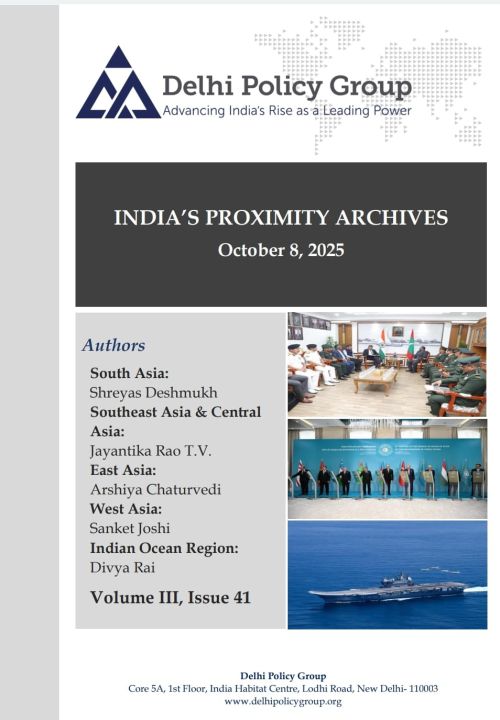India's Proximity Archives
South Asia
Raytheon will provide Pakistan with an unspecified number of AIM-120 AMRAAM missiles, according to a newly modified arms contract notified by the US Department of War. The May 7, 2025, contract for the AMRAAM deal did not list Pakistan as a purchaser of the missile. A press release dated September 30, concerning contracts issued by the US Department of War for the US Air Force, indicated that Raytheon received a $41.6 million firm-fixed-price modification to a prior contract for the enhanced C8 and D3 AMRAAM variants and their production. F-16 Falcons operated by the Pakistan Air Force (PAF) are equipped with US-manufactured missiles.
Southeast Asia
On October 1, the spokesperson of the Royal Thai Army announced that Thailand has no imminent plans to reopen its fractious border with Cambodia. The border has remained closed since five days of clashes between the two countries’ militaries in July left dozens of people dead and displaced hundreds of thousands. The move has dealt a major economic blow to both nations, with Cambodia suffering more since Thailand plays a key role in its supply chains. Cambodia’s Senate President Hun Sen, the former prime minister and father of Prime Minister Hun Manet, who has played a prominent role in the dispute, said on Facebook that if Thailand reopens the border, Cambodia will reciprocate within five hours - but it will not bend its knee.
East Asia
Sanae Takaichi was elected leader of Japan’s ruling Liberal Democratic Party (LDP) on October 4. Earlier, Ishiba Shigeru had announced his resignation from the post of Japan’s Prime Minister in September 2025. The 64-year-old Takaichi stands to become the country’s first-ever female prime minister in the parliamentary vote to select the new premier scheduled for later this month. She invoked a victory call to build a strong and prosperous Japan, which could be passed on to the next generation. Takaichi is considered a right-wing figure within the LDP, with her political stance combining ultranationalism and social conservatism with an aggressive fiscal stance, which is a stark departure from Ishiba’s moderate approach. Her fiscal approach is guided by that of former Prime Minister Shinzo Abe, as she advocates aggressive public spending and low-interest borrowing to stimulate Japan’s stagnant economy. She has even indicated during a TV debate last month, the possibility of renegotiation of the US-Japan Trade deal if, during implementation, some provisions are negatively affecting Japan’s national interest.
West Asia
On October 5, US President Donald Trump warned Hamas that ceasefire negotiations in Gaza must move expeditiously or “massive bloodshed will follow”. According to him, positive talks have been held with Hamas to secure the release of Israeli hostages held in Gaza and end the war, which could lead to peace in the Middle East. On October 3, in accordance with the US-proposed 20-point Gaza peace plan, Hamas agreed to release all Israeli hostages (alive or dead), as well as to negotiate a ceasefire with Israel, provided it received guarantees that the war would be ended and that such acts would not occur again. The indirect talks between Hamas and Israel in Sharm El Sheikh are being mediated by Qatar, Egypt, and President Trump's advisers Steve Witkoff and Jared Kushner.
Central Asia
On October 6-7, leaders from Azerbaijan, Kazakhstan, Kyrgyzstan, Turkiye and Uzbekistan convened in Gabala, in northern Azerbaijan, for the 12th summit of the Organization of Turkic States (OTS). The summit follows the September meeting of Vice Ministers in Bishkek and will see Azerbaijan take on the rotating presidency of the transnational organisation. The Heads of State reaffirmed their commitment to advancing the shared vision of a peaceful, secure, and prosperous Turkic World. They emphasised the importance of deepening cooperation in political affairs, foreign policy, security, economy, and people-to-people relations under the OTS framework. Following the summit, the leaders signed the Gabala Declaration to conclude the initiatives.
Indian Ocean Region
Exercise KONKAN-25 between the Indian Navy and Royal Navy began on October 5, 2025, off India’s west coast, marking two decades of growth in scale, complexity, and mutual understanding in maritime operations. Conducted in harbour and sea phases until 12 October, the exercise features professional exchanges, cross-deck visits, sports and cultural engagements, as well as advanced operational drills including anti-air, anti-surface, and anti-submarine warfare, flying operations, and seamanship evolutions. Both navies will field frontline assets — aircraft carriers, destroyers, frigates, submarines, and shore-based as well as integral air elements. Frontline assets from both sides are participating, with the UK Carrier Strike Group 25 led by HMS Prince of Wales, joined by units from Norway and Japan and India’s carrier battle group centred around INS Vikrant. On the conclusion of Exercise Konkan 2025, UK CSG 25 is scheduled to participate in a one-day exercise with the Indian Air Force off the west coast of India on October 14, 2025, before continuing with her planned deployment.



